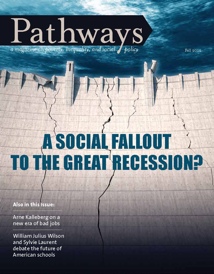Chandra Muller, a sociologist at the University of Texas, as co-authored a new article in the latest issue of Social Forces. Funded by an award from the Russell Sage Foundation, Muller's study examines school stratification in new and established immigrant destinations. Here is the abstract:
The growth and geographic diversification of the school-age Latino population suggest that schools in areas that previously had very few Latinos now serve many of these students. This study uses the 1999-2000 Schools and Staffing Survey and the Education Longitudinal Study of 2002 to compare public high schools in new and established Latino destinations. We examine school composition, school quality indicators, instructional resources and access to advanced math courses. We find that schools in new destinations display more favorable educational contexts according to a number of measures, but offer fewer linguistic support services than schools in established destinations. We also find evidence of a within-school Latino-white gap in advanced math course taking in new destinations, suggesting greater educational stratification within schools in those areas.
 The Fall 2012 issue of Pathways, a magazine produced by the Stanford Center on Poverty and Inequality, features several RSF-funded briefs on the social fallout of the Great Recession. The reports are part of the Foundation's Great Recession initiative, which has funded more than two dozen projects in the last two years that will assess the effects of the Great Recession on the economic, political, and social life of the country.
The Fall 2012 issue of Pathways, a magazine produced by the Stanford Center on Poverty and Inequality, features several RSF-funded briefs on the social fallout of the Great Recession. The reports are part of the Foundation's Great Recession initiative, which has funded more than two dozen projects in the last two years that will assess the effects of the Great Recession on the economic, political, and social life of the country.
Here are brief descriptions of the articles in Pathways:
Douglas S. Massey: The Great Decline in American Immigration?Immigration has been a major component of demographic change in the United States over the past several decades, constituting at least a third of U.S. population growth and up to half of labor force growth in any given year. By any standard, it is a central feature of the nation’s political economy and thus especially important to monitor as the Great Recession plays out. This brief reviews levels and patterns of immigration to the United States over the past three decades, with a particular focus on their implications for the nation as it recovers from the worst economic downturn since the 1930s.
Christopher Uggen: The Crime Wave That Wasn't
This brief review of statistics before and since the Great Recession’s onset provides clear evidence for a decline in crime from 2007 to 2010. It also shows a consistent, albeit less steep, drop over that period in most correctional populations. To date, then, there is little evidence that great numbers of people have “turned to crime” in response to economic recession.
Sarah Burgard: Is the Recession Making Us Sick?
We pose the following questions: Is the recession lowering the aggregate level of physical well-being in the U.S.? Is it lowering the aggregate level of mental wellbeing? How has access to health care changed, if at all, with the recession?
The decision to have a baby, to form or end a union, and to return to the nest are all family behaviors that might be sensitive to economic downturns. Is the recession indeed changing the family? And are "red" and "blue" families reacting differently?
